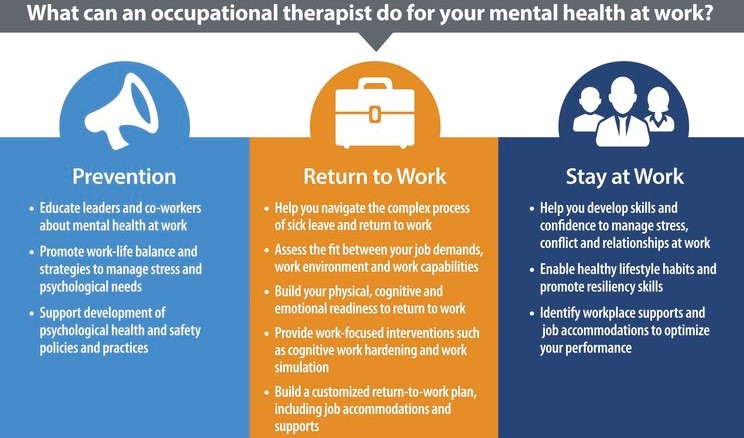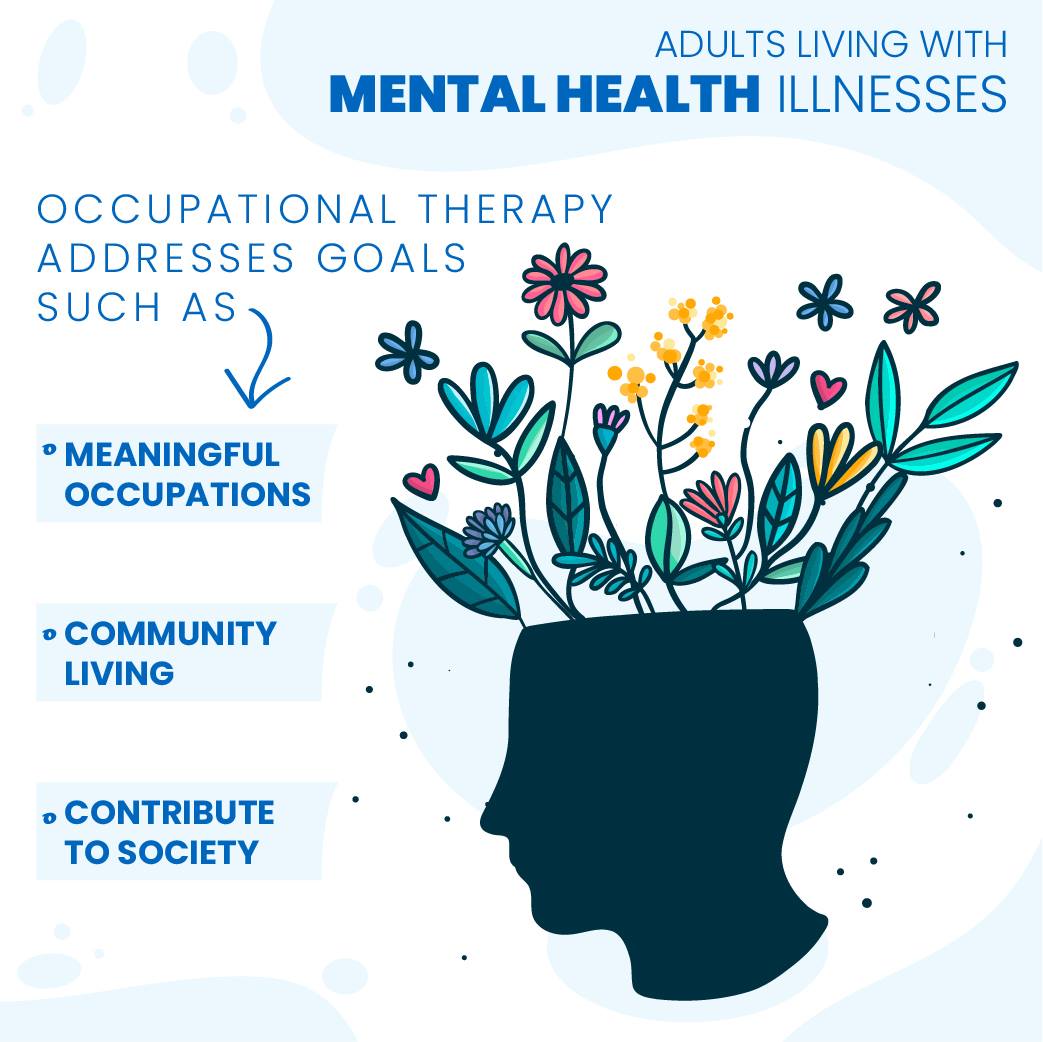Work-Related Self-Efficacy of Mental Health OTs
Work-related self-efficacy of occupational therapists in mental health is crucial for both therapist well-being and positive patient outcomes. This exploration delves into the factors influencing this self-efficacy, from training and experience to the impact of specific interventions and the challenges of managing demanding workloads and burnout. Understanding these dynamics is key to fostering a supportive environment and improving the effectiveness of mental health occupational therapy.
We’ll examine how proficiency in various therapeutic approaches contributes to a therapist’s confidence and how successfully navigating difficult patient behaviors shapes their sense of self-efficacy. The role of organizational support, professional development, and self-care practices in maintaining high levels of self-efficacy will also be discussed, along with identifying areas for future research to further enhance the field.
Work-Related Self-Efficacy of Occupational Therapists in Mental Health
This article explores the crucial role of work-related self-efficacy in the success and well-being of occupational therapists (OTs) working within mental health settings. We will examine the factors influencing self-efficacy, its impact on patient outcomes and therapist well-being, and strategies for enhancing it. Understanding and improving self-efficacy is vital for ensuring the effectiveness and sustainability of OTs in this demanding field.
Defining Work-Related Self-Efficacy in Occupational Therapy within Mental Health
Work-related self-efficacy refers to an OT’s belief in their ability to successfully perform specific tasks and achieve desired outcomes within their mental health practice. This encompasses confidence in their clinical skills, ability to manage challenging patient behaviors, and effectiveness in collaborating with other healthcare professionals. High self-efficacy is paramount for OTs in mental health because it directly influences their job satisfaction, resilience, and ultimately, the quality of care provided to patients.
A strong sense of self-efficacy allows therapists to approach complex cases with confidence and effectively adapt their interventions to meet individual patient needs. This, in turn, positively impacts patient progress and the therapist’s overall well-being, reducing burnout and increasing job satisfaction.
Factors Influencing Self-Efficacy Among Occupational Therapists in Mental Health

Several factors contribute to the development and maintenance of high self-efficacy among OTs in mental health. These factors can be broadly categorized into personal, professional, and organizational elements.
It’s a complex issue, but many wonder if improving access to mental healthcare could help reduce gun violence. Check out this insightful article on whether implementing more mental health facilities could decrease mass shootings: would implementing more mental health facilities decreas mass shootings. This is crucial, and contacting your elected officials is a powerful way to advocate for change.
If you’re looking for guidance on how to effectively communicate your concerns, learn how to write to a senator about mental health care needs by visiting this helpful resource: writing to a senitor about mental health care needs. Your voice matters in pushing for better mental health support and safer communities.
- Training and Experience: Comprehensive training programs equipping OTs with a wide range of therapeutic interventions and skills significantly enhance their self-efficacy. Increased experience in managing diverse mental health conditions and patient populations further strengthens this belief in their capabilities. For example, a therapist who has successfully managed several patients with severe anxiety will likely have higher self-efficacy in treating future anxiety patients than a newly graduated therapist.
- Organizational Factors: Supportive work environments characterized by strong teamwork, adequate resources, and access to supervision play a crucial role in boosting self-efficacy. A culture of mentorship and collaboration where therapists can openly discuss challenges and learn from each other fosters a sense of confidence and competence. Conversely, inadequate resources, excessive workloads, and a lack of support can significantly undermine self-efficacy.
For instance, a therapist working in an understaffed clinic with limited access to specialized equipment may experience lower self-efficacy compared to a colleague in a well-resourced setting.
- Personal Factors: Resilience, a positive self-image, and a proactive approach to professional development are personal attributes that contribute to higher self-efficacy. Therapists who actively seek opportunities for professional growth, engage in self-reflection, and maintain a healthy work-life balance tend to demonstrate greater self-efficacy in their work.
The Role of Specific Skills and Interventions in Shaping Self-Efficacy
Proficiency in specific therapeutic interventions directly correlates with an OT’s self-efficacy. Successful application of evidence-based practices, such as cognitive behavioral therapy (CBT) or mindfulness techniques, builds confidence and reinforces the belief in one’s ability to help patients. Conversely, difficulty in implementing interventions or experiencing setbacks can negatively impact self-efficacy. The type of mental health condition also influences the therapist’s self-efficacy.
For example, a therapist specializing in trauma-informed care might feel more confident working with individuals who have experienced trauma than with those suffering from psychosis. Successfully navigating challenging patient behaviors, such as aggression or resistance, also strengthens self-efficacy. The ability to de-escalate situations and establish therapeutic rapport contributes to a sense of competence and control.
It’s a complex issue, whether increasing access to mental healthcare would actually decrease mass shootings, as explored in this insightful article: would implementing more mental health facilities decreas mass shootings. Many believe improved access is crucial, and advocating for better mental health resources is vital. If you feel strongly about this, consider writing to your senator; here’s a guide on writing to a senitor about mental health care needs to effectively communicate your concerns and push for change.
Ultimately, a multifaceted approach is needed to address this serious problem.
Strategies for Enhancing Work-Related Self-Efficacy, Work-related self-efficacy of occupational therapists in mental health
Several strategies can be implemented to enhance work-related self-efficacy among OTs in mental health. A multifaceted approach encompassing professional development, mentorship, and supportive work environments is most effective.
- Professional Development: Opportunities for advanced training in specific therapeutic modalities, continuing education courses, and participation in workshops focusing on managing challenging behaviors all contribute to increased self-efficacy. These opportunities provide therapists with new skills and strategies, enhancing their confidence in their ability to effectively treat a wider range of patients.
- Mentorship and Peer Support: Pairing experienced therapists with newer colleagues in a mentorship program provides valuable guidance and support. Peer support groups allow therapists to share experiences, discuss challenges, and learn from each other, fostering a sense of community and reducing feelings of isolation.
- Supportive Work Environment: Creating a supportive work environment involves providing adequate resources, reducing excessive workloads, and promoting open communication and collaboration among team members. Regular supervision and access to mental health support for therapists are also crucial in maintaining high self-efficacy.
The Impact of Workload and Burnout on Self-Efficacy
High workloads and burnout are significant factors that negatively impact self-efficacy. Excessive caseloads, administrative burdens, and long working hours can lead to feelings of overwhelm and incompetence, diminishing an OT’s belief in their ability to provide effective care. Burnout, characterized by emotional exhaustion, depersonalization, and reduced personal accomplishment, further erodes self-efficacy. This creates a vicious cycle where decreased self-efficacy leads to increased stress and burnout, further reducing self-efficacy.
- Mitigation Strategies: Implementing strategies to mitigate the negative effects of workload and burnout is essential for maintaining high self-efficacy. These strategies include establishing realistic caseloads, providing adequate administrative support, promoting work-life balance, and providing access to employee assistance programs (EAPs) and stress management resources.
- Self-Care Practices: Prioritizing self-care practices, such as regular exercise, mindfulness, and sufficient sleep, is crucial for maintaining both physical and mental well-being. These practices help to reduce stress, improve resilience, and ultimately, enhance self-efficacy.
Future Research Directions

Further research is needed to fully understand the complex interplay between work-related self-efficacy, patient outcomes, and therapist well-being in mental health settings. Longitudinal studies tracking self-efficacy levels over time, considering various factors such as experience, training, and work environment, are crucial. Investigating the effectiveness of specific interventions aimed at enhancing self-efficacy is also necessary. Finally, research exploring the cultural and contextual factors influencing self-efficacy in diverse mental health settings would contribute significantly to this field.
Ultimately, bolstering the work-related self-efficacy of occupational therapists in mental health is a multifaceted endeavor. By addressing the contributing factors, providing targeted support, and fostering a positive work environment, we can empower therapists to provide the best possible care while safeguarding their own well-being. Continued research and a proactive approach to professional development are essential to ensure the ongoing success and resilience of this vital profession.
Share this content:
